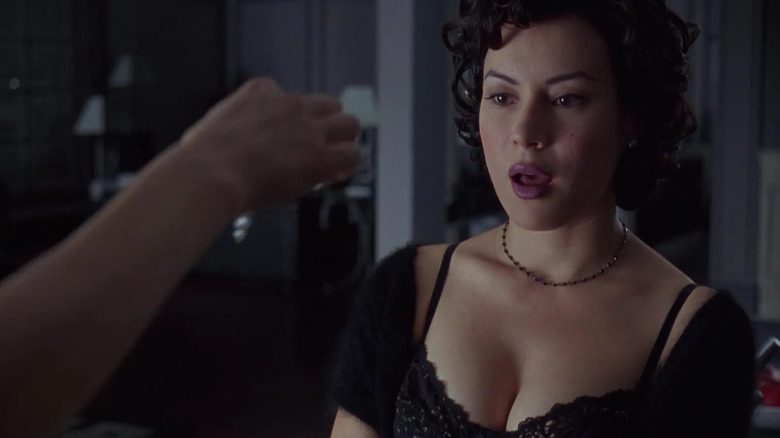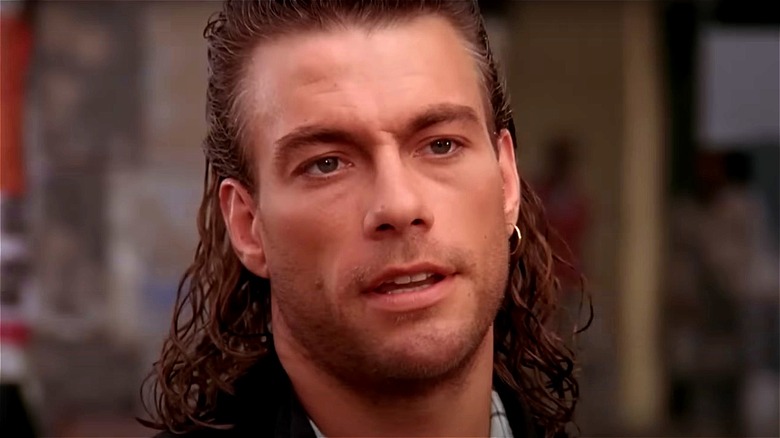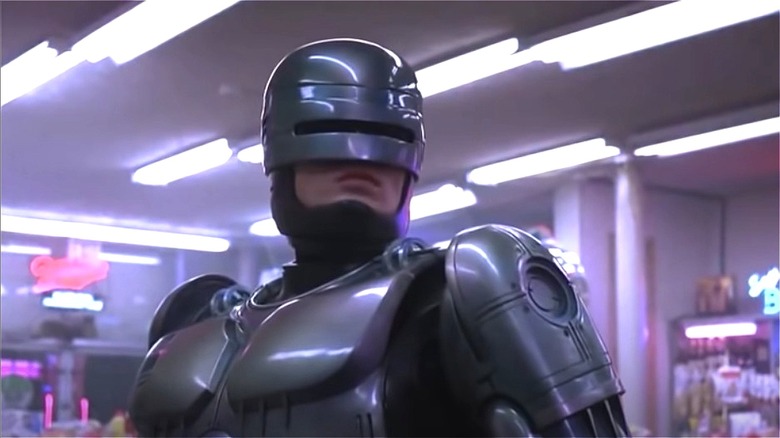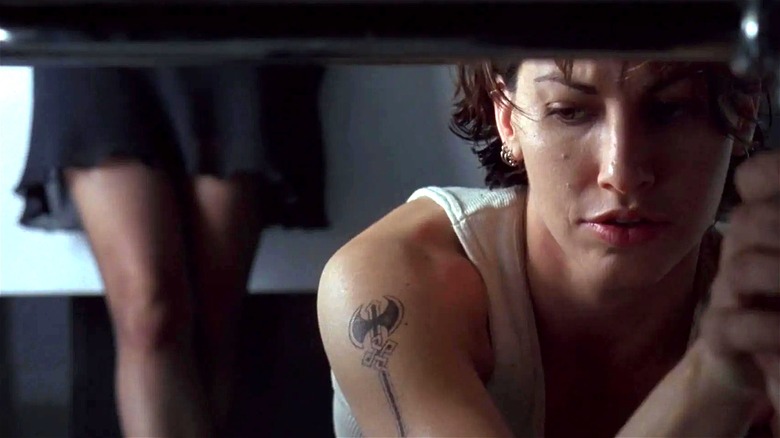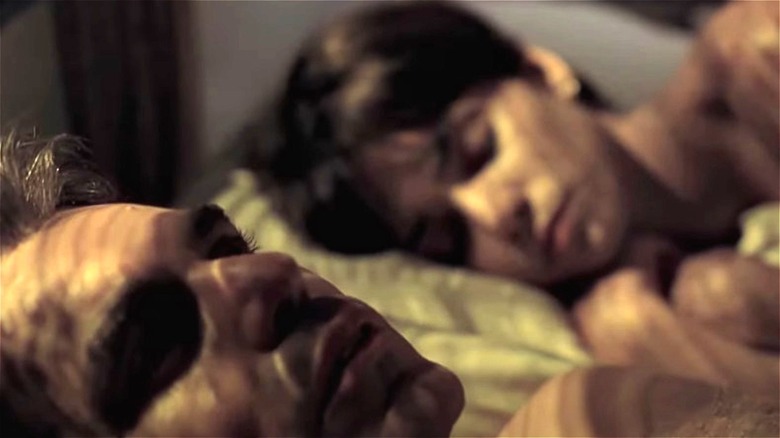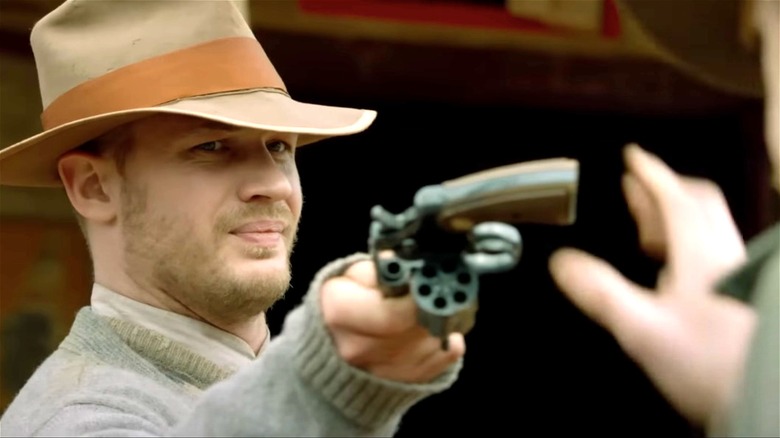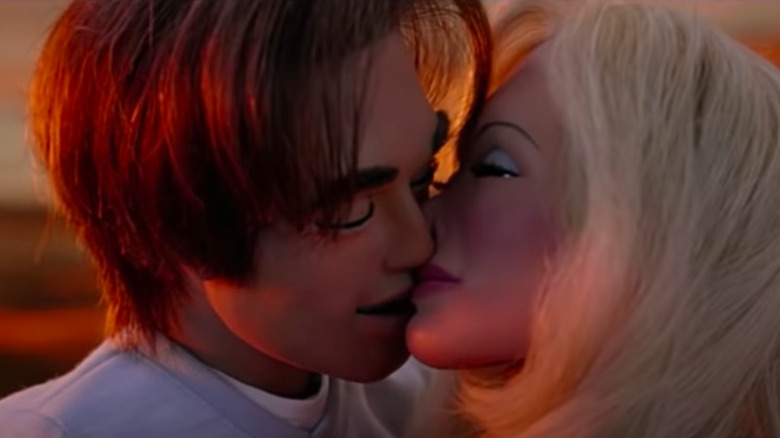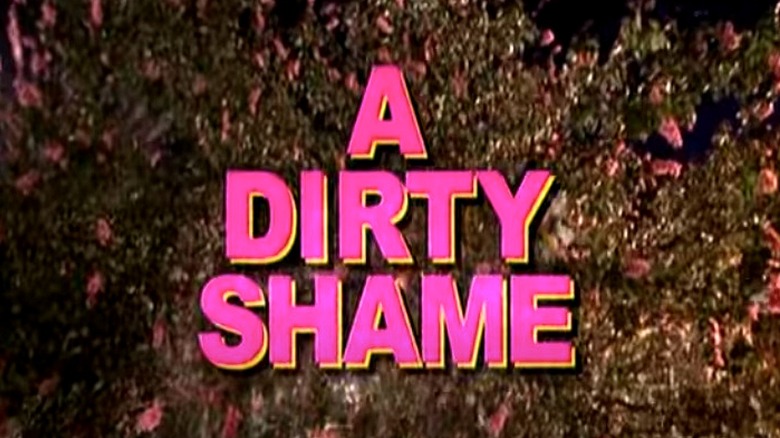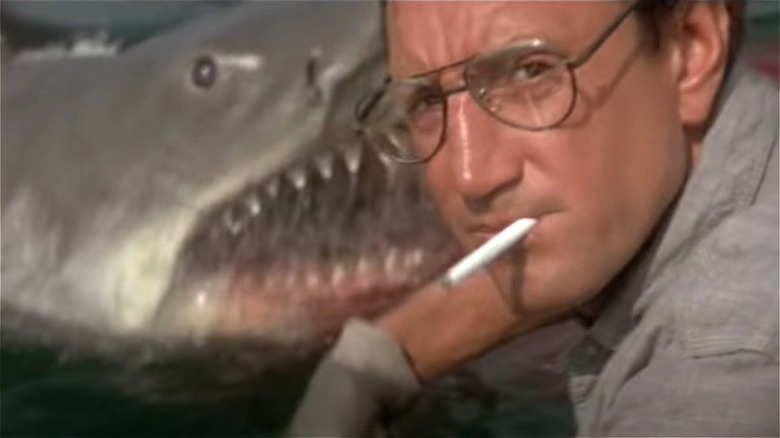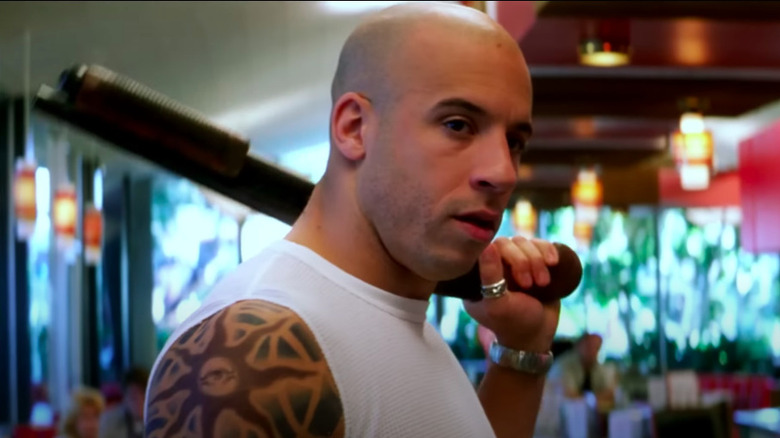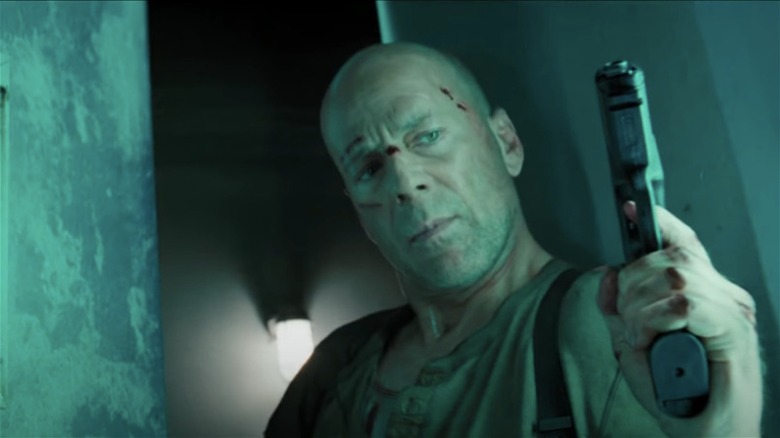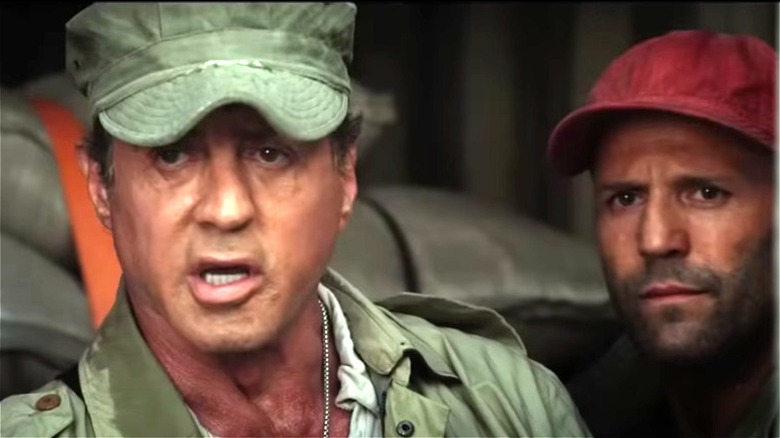R-Rated Movie Scenes We Never Got To See In The Original Cut
The horror genre and its directors may have endured the most clashes with the Motion Picture Association and the world's other regulatory boards, but Wes Craven, Tobe Hooper, Ruggero Deodato, and a dozen other horror filmmakers are not the only ones. Numerous directors across action, drama, and even comedy have adjusted their content for release, and often at the perilous threshold between R and NC-17.
This distinction is particularly important because some theater chains refuse to show NC-17-certified films and several media outlets even refuse to run ads (via NPR). It's an odd streak of puritanism not found in other markets, such as the United Kingdom, where the equivalent "18" rating carries no such stigma.
R ratings can be very lucrative, but only one example — the disturbing, incendiary "Joker" — has ever made over $1 billion, which places it toward the bottom of the top 50 highest-grossing films — a space dominated by PG-13 film (via Box Office Mojo). This clear financial incentive routinely prompts studios to nip and tuck their work for the MPA to secure a wider audience and a fatter wallet.
Hard Target
Hong Kong director John Woo needed a hit with "Hard Target," his first Hollywood movie. It was 1993 — the age of the R-rated action film — and Woo delivered near-constant balletic carnage. Sure enough, the MPA stamped his explosive 99-minute cut with an NC-17. This setback proved doubly frustrating because the MPA provided no scene analysis. That left Woo and Universal Pictures to figure it out for themselves (via Cutting Edge).
In all, Woo submitted "Hard Target" some six or seven times before receiving an R rating. The cuts totaled around four minutes and they softened about 15 instances of high-impact violence, most of them gunshot squibs or arrow injuries. "Hard Target" was a box office success, but Woo shared his reservations about the American system with Vibe magazine, saying "There are so many politics and games and egos here. I just haven't gotten used to the studio system. In Hong Kong, I have more freedom. Here, I need to tone down a lot of the violence. Well, everything has to be toned down."
RoboCop
"RoboCop" kicked off the first of numerous MPA clashes for Paul Verhoeven, the Dutch director whose follow-ups include "Basic Instinct" and "Showgirls." "I had a hard time because in Holland, there were no restrictions," Verhoeven told Esquire, "That was very difficult for me to deal with. It was very unusual that people would tell me how to shoot my movie."
By the time "RoboCop" finally received the necessary R rating, Verhoeven had submitted the film to the MPA eight times and cut 30 seconds of footage. A majority of the cuts affected two scenes early in the film. First was Mr. Kinney's bloody death courtesy of ED-209, a towering mechanical law enforcement beast. Verhoeven considered the scene comical but the MPA didn't see the funny side and asked for the squib bursts to be reduced considerably.
The second batch of cuts involved Officer Murphy's brutal, protracted death at the hands of Boddicker and his gang of thugs. Trims included shots of Murphy's obliterated hand, the removal of his entire arm, and a final gunshot to the officer's head. The killers' mocking sadism was reduced, too (via Cutting Edge).
Bound
The MPA requested numerous cuts in "Bound," the Wachowskis' lesbian neo-noir thriller starring Jennifer Tilly and Gina Gershon. Three seconds, for instance, were pared from the sight of a character's face being smashed against a toilet but the MPA's main objections concerned the film's more tender moments, especially a sequence in which Violet (Tilly) masturbates Corky (Gershon).
The MPA deemed this act as NC-17-worthy because of the vigorous hand movement and, curiously, the actors' skill. Tilly recollected the MPA exchange to Vulture, "The MPA said [to the Wachowskis], 'Because Jennifer and Gina are such good actors, it looks like she's really giving her a hand job.'" The filmmakers asked if the censors would have relented if the performances were worse, and their answer was effectively, "Well... yeah."
Fortunately, the Wachowskis repurposed several takes they had on hand into something that they felt was "10 times more graphic... you missed the hand but gained a breast... but because you missed the hand, the MPAA said it was all right."
Monster's Ball
"Monster's Ball" didn't pose a problem for the BBFC, which passed the film not just uncut but with a 15 certificate. In their 2002 annual report, the board reasoned, "'Monster's Ball' contained at least one sex scene which might have justified an '18' certificate had it occurred in a film offering sexual thrills as the primary pleasure... [but] the scene was judged to be acceptable in the context of the film as a whole."
Alas, director Marc Forster experienced no such nuance when he submitted his film to the MPA, which ordered some 60 seconds of cuts from two sex scenes. Nudity and thrusting — the latter a running issue for the MPA — got axed in an early motel scene between Sonny (Heath Ledger) and a sex worker. The remaining cuts chipped away at the famously erotic scene between Hank (Billy Bob Thornton) and Leticia (Halle Berry), both guilty of too much nudity and too much thrusting.
Lawless
John Hillcoat established himself as an uncompromising director in 2005 with "The Proposition," a harsh 1880s meat pie Western about violence and rape in the Australian outback. Seven years later, in 2012, the filmmaker applied a similarly potent aesthetic to bootlegging and the Great Depression in "Lawless," which starred Tom Hardy, Shia LaBeouf, Jessica Chastain, and Guy Pearce.
The MPA asked for several cuts before they could provide an R rating. The shooting of a pig, for example, had to be conveyed off-screen rather than explicitly on it. Trimmed also was a protracted assault in which Special Deputy Rakes (Pearce) punches Jack Bondurant (LaBeouf) repeatedly in the face. The sight of Forrest Bondurant's (Hardy) brutally slashed throat also lost a couple of seconds or so. About five further seconds were cut from a scene of castration and an arterial gunshot wound in the film's climactic shootout (via Cutting Edge).
Team America: World Police
The notoriously bawdy puppet comedy "Team America: World Police" was designed to provoke the MPA, especially the outrageous sex scene. "We purposely left in stuff that you don't even want in the scene because you have to give them something to cut so they feel like they've p***ed on it somewhat," Trey Parker – who directed the movie and co-wrote it with Matt Stone and Pam Brady — told filmmaker Kirby Dick. This "stuff" ran to about four minutes and included pretty much every sex act that two adults can indulge in.
This was intended as classic bargaining — go way too high so they won't go too low. However, the MPA said they would need to reduce the puppets' lustful acrobatics to only two positions, missionary and Lisa (voiced by Kristen Miller) on top. Ultimately, the filmmakers negotiated a middle ground after nine submissions (via Trey Parker).
A Dirty Shame
The MPA's reaction to "A Dirty Shame" so dispirited John Waters that he hasn't directed a feature film since. "What can I cut?" Waters asked upon hearing he'd got the NC-17 stamp. "To be honest, we stopped taking notes... there's a thousand brush strokes in this, you can't cut 10," was the MPA's answer.
Waters was at a loss because he considered "A Dirty Shame" far too silly to earn an NC-17. One theory suggested that the Abu Ghraib prison photos — which emerged just a week or two before the MPA viewed his film — soured the culture against perverted sexuality (via This Film is Not Yet Rated).
Whatever the reason, Waters had no choice. He released the film with an NC-17 certificate and, like almost every film in with that classification, it bombed at the box office, earning just $1.9 million (via Box Office Mojo). An R-rated cut called "The Neuter Version" arrived on DVD in June 2005. Reflecting on the experience, Waters told filmmaker Kirby Dick, "What it said to me this time was that not only can't you make a movie where you show sex, you can't even talk about sex all through it... that's new to me."
Jaws
"Jaws" enjoyed a pretty easy ride with the MPA and the BBFC; few PG-rated films can get away with slaughtered children, one-eyed corpses, and bloody, agonized screams. Director Steven Spielberg made just one concession to the MPA, cutting a second or so from the gruesome severed leg scene. "I was happy to do it," Spielberg said on the Laserdisc commentary, "because they didn't ask me to cut the leg out, they just asked me not to let the leg hit, bounce, gush blood, settle 'cos I was really studying it. So, I cut about a foot and half to two feet off that shot."
The BBFC wasn't without reservations, either. Secretary Stephen Murphy objected to Quint coughing up blood in his final terrifying moments, but the Board's president dismissed his concerns and passed the film with an A, the equivalent of a PG. Strangely, the BBFC raised this certificate to 12A almost 40 years later in 2012, with the following content summary: "Contains moderate threat and occasional gory moments." I can think of no other film that has received a higher classification so long after release (via Cutting Edge).
xXx
"xXx" came along at the tail end of the action hero vehicle trend, which the Marvel Industrial Complex soon more or less replaced. Directed by Rob Cohen and starring Vin Diesel, it was presented as a new, Americanized kind of James Bond film whose hero was street-smart rather than suave and caddish. The key similarity? Its PG-13 content, although a few spicier moments hit the cutting room floor, among them two shots of sexualized nudity that made their way into a "Director's Cut" a few years later (via Cutting Edge).
xXx found more trouble with the BBFC, which gave a 12A rating only after cuts to a forceful headbutting scene in which Diesel's character thrusts his big dome into an NSA's agent nose. Their annual report read, "The Board takes care that such combat techniques do not feature in films in the junior categories in contexts that invite imitation."
Live Free or Die Hard
Twelve years after "Die Hard with a Vengeance," John McClane (Bruce Willis) returned to action in "Live Free or Die Hard" (2007), which featured the tagline, "The old school cop is back!" Yeah, and with a brand-new PG-13 certificate. This was greatly at odds with the series' "R" standard. How was McClane going to say "Yippee-ki-yay, mother****er"? A conveniently placed gunshot took care of that.
In all, Twentieth Century Studios agreed to 27 violence cuts and 37 cuts to dialogue (via Movie-Censorship). This amounted to around only eight seconds, because many "cuts" just replaced or obscured swear words — from varieties of "f***" all the way down to "goddammit" — which had no effect whatsoever on the running time. Violence cuts reduced about half a dozen VFX bullet impacts and a little bit of old-fashioned corn syrup, namely a man's bloodied face about 94 minutes into the film. Regardless of the trims, "Live Free or Die Hard" grossed $388 million worldwide. Yippee-ki-yay, mother****er, indeed.
The Expendables 3
The recent "The Expendables 4" film made a point of its R rating. The red-band trailer announced, "We heard you loud and clear" and referenced several social media accounts asking for "Violence, and lots of it." This served as a response to "The Expendables 3," which frustrated fans with its family-friendly PG-13 rating, which removed some 350 seconds of shooting and stabbing compared to the eventual unrated version (via Movie-Censorship).
"We want to reach as many people as possible," Sylvester Stallone explained to Deadline. "It's very close to an R, believe me, it's right there. But I think we owe it to the next generation. We thought we'd join that club for a while." Both films succeeded at the box office but he likely felt concerned about the domestic gross, which dropped from $103 million to $85 million (via Numbers). When "The Expendables 3" reached no more than $39 million in U.S. theaters, Stallone said the rating had been "a horrible miscalculation on everyone's part [to] diminish the violence that the audience expects."
